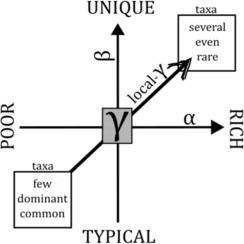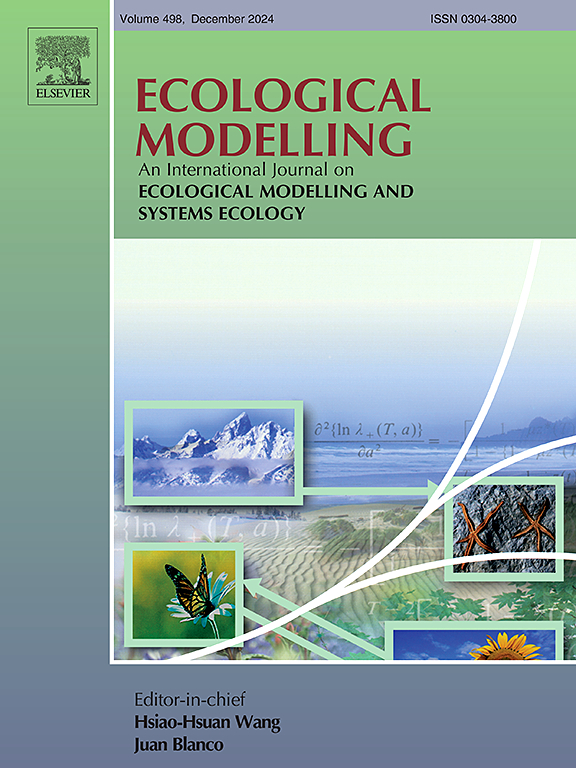Decomposition of Whittaker’s gamma diversity: a novel way combining entropies and divergences
IF 3.2
3区 环境科学与生态学
Q2 ECOLOGY
引用次数: 0
Abstract
Accurate, standardized, and comparable methods for estimating biodiversity are crucial in ecology to properly assess and monitor the health of communities. Special cases of generalized entropy are commonly used to estimate alpha diversity. The related concept of generalized divergence can be used to estimate the beta diversity. Using cross entropy notion, we propose a modular decomposition of gamma diversity by using entropy and divergence functions. We prove that if alpha is Shannon entropy and beta is Kullback-Liebler divergence, the classical Whittaker’s gamma diversity is mathematically decomposed via our proposed local gamma index. To show the ecological application of this index and its generalization we compute the local gamma of several orders using a real large biological dataset. The index is discussed in detail for two limit cases, one where the contribution of rare species is the highest and one where richness and evenness are balanced. The index defines a gradient from communities that are dominated by a few common species toward samples shared among several uncommon ones. Our findings support divergence-based measures as practical estimators of beta diversity. Also, the framework here proposed, based on entropy, divergences and cross-entropies, allows us to compute the classic gamma diversity while providing components that are independent, comparable, self-reliant and pointwise distributed.

惠特克γ多样性的分解:一种结合熵和散度的新方法
在生态学中,准确、标准化和可比较的生物多样性估算方法对于正确评估和监测社区健康至关重要。广义熵的特殊情况通常用于估计α多样性。广义散度的相关概念可用于估计beta多样性。利用交叉熵的概念,利用熵函数和散度函数提出了一种分集的模分解方法。我们证明了如果α是Shannon熵,β是Kullback-Liebler散度,经典Whittaker的伽马多样性可以通过我们提出的局部伽马指数进行数学分解。为了展示该指数的生态应用及其泛化,我们使用一个真实的大型生物数据集计算了几个阶的局部伽马。详细讨论了两种极限情况下的指数,一种是稀有物种的贡献最高,一种是丰富度和均匀度平衡。该指数定义了一个梯度,从由少数常见物种主导的群落到几个不常见物种共享的样本。我们的研究结果支持基于差异的度量作为beta多样性的实用估计。此外,本文提出的基于熵、散度和交叉熵的框架允许我们计算经典的伽马多样性,同时提供独立、可比、自依赖和点分布的组件。
本文章由计算机程序翻译,如有差异,请以英文原文为准。
求助全文
约1分钟内获得全文
求助全文
来源期刊

Ecological Modelling
环境科学-生态学
CiteScore
5.60
自引率
6.50%
发文量
259
审稿时长
69 days
期刊介绍:
The journal is concerned with the use of mathematical models and systems analysis for the description of ecological processes and for the sustainable management of resources. Human activity and well-being are dependent on and integrated with the functioning of ecosystems and the services they provide. We aim to understand these basic ecosystem functions using mathematical and conceptual modelling, systems analysis, thermodynamics, computer simulations, and ecological theory. This leads to a preference for process-based models embedded in theory with explicit causative agents as opposed to strictly statistical or correlative descriptions. These modelling methods can be applied to a wide spectrum of issues ranging from basic ecology to human ecology to socio-ecological systems. The journal welcomes research articles, short communications, review articles, letters to the editor, book reviews, and other communications. The journal also supports the activities of the [International Society of Ecological Modelling (ISEM)](http://www.isemna.org/).
 求助内容:
求助内容: 应助结果提醒方式:
应助结果提醒方式:


